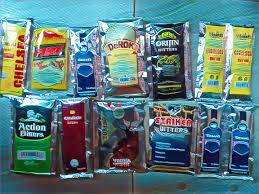
Amid rising concerns over the widespread abuse of cheap alcoholic drinks and their devastating effects on public health, the Senate has directed the National Agency for Food and Drug Administration and Control (NAFDAC) to ensure full enforcement of the ban on the production and sale of alcohol in sachets by December 31, 2025.
Lawmakers said the decision underscores efforts to protect young Nigerians from the harmful effects of unregulated alcohol consumption and aligns with global standards designed to reduce substance abuse and its associated social consequences.
The resolution followed a motion of urgent national importance sponsored by Senator Asuquo Ekpenyong (Cross River South) during Thursday’s plenary session.
Leading the debate, Ekpenyong recalled that in 2018, the Federal Ministry of Health, Federal Competition and Consumer Protection Commission (FCCPC), NAFDAC, and industry stakeholders including the Association of Food, Beverage and Tobacco Employers (AFBTE), entered into a five-year Memorandum of Understanding (MoU) to gradually phase out sachet and small-bottle alcoholic drinks.
He explained that the Federal Government, after appeals from manufacturers, granted a one-year moratorium in 2024 to allow producers exhaust existing stock and transition to safer, compliant packaging alternatives.
However, Ekpenyong expressed concern that some manufacturers are lobbying for yet another extension—an action he warned could undermine regulatory integrity, endanger public health, and sustain the circulation of harmful alcoholic products.
“As the December 2025 deadline approaches, certain manufacturers are lobbying for another extension, thereby undermining the regulatory process and jeopardizing public health.
“We cannot continue to expose our youths to cheap, easily accessible alcohol that destroys lives and endangers public safety”, Ekpenyong said.
He further noted that the continued sale of high-strength alcoholic beverages in sachets has contributed to addiction, impaired cognitive development, school dropouts, domestic violence, and road accidents, particularly among commercial drivers and young people.
Ekpenyong added that manufacturers who have already complied with the directive now face unfair competition from those who continue to produce non-compliant products, creating an uneven playing field.
Supporting the motion, Senator Anthony Ani (Ebonyi South) described the easy accessibility of cheap alcohol as a growing social menace, warning that it fuels antisocial behaviour and threatens the future of young Nigerians.
“The easy availability of cheap alcohol is fueling social vices. We must act now to save our young generation from self-destruction”, Ani stated.
In his ruling, Senate President Godswill Akpabio hailed the resolution as a timely intervention to protect public health and youth welfare. He urged NAFDAC to enforce the ban without delay, warning that any further extension would undermine Nigeria’s campaign against substance abuse.



